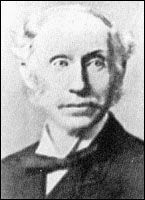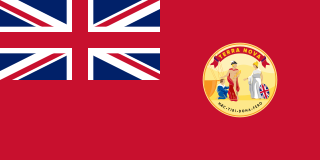Augustus Frederick Goodridge was a Newfoundland merchant and politician. He was premier of Newfoundland in 1894.

Sir William Vallance Whiteway, was a politician and three time Premier of Newfoundland.

Sir Robert Thorburn was a Newfoundland merchant and politician who served as the colony's Premier from 1885 to 1889.
George Edward Shea was a Newfoundland politician who served as the first mayor of St. John's, Newfoundland.

The 8th Newfoundland general election was held in 1859 to elect members of the 7th General Assembly of Newfoundland in the Dominion of Newfoundland. 18 Liberals and 12 Conservatives were elected. The Liberal Party led by John Kent formed the government.
The 7th Newfoundland general election was held in 1855 to elect members of the 6th General Assembly of Newfoundland. This was the first election after responsible government was introduced to the Dominion of Newfoundland. The Liberal Party led by Philip Francis Little formed the government.
The 15th Newfoundland general election was held in 1882 to elect members of the 14th General Assembly of Newfoundland in the Dominion of Newfoundland. The Conservative Party led by William Vallance Whiteway formed the government.

The 13th Newfoundland general election was held in 1874 to elect members of the 12th General Assembly of Newfoundland in the Dominion of Newfoundland. The Conservative Party led by Frederick Carter formed the government.
The 14th Newfoundland general election was held in 1878 to elect members of the 13th General Assembly of Newfoundland in the Dominion of Newfoundland. The Conservative Party led by William Vallance Whiteway formed the government.

The 12th Newfoundland general election was held in November 1873 to elect members of the 11th General Assembly of Newfoundland in the Dominion of Newfoundland. The Anti-Confederates led by Charles Fox Bennett formed the government; a "new" Conservative party led by Frederick Carter formed the opposition.
The 17th Newfoundland general election was held on 6 November 1889 to elect members of the 16th General Assembly of Newfoundland in the Dominion of Newfoundland. The Reform Party administration of Robert Thorburn was defeated in favour of the Liberal Party led by William Whiteway formed the government. Reform soon disappeared and was replaced by the Orange Order based Tory Party. This was the first general election held in Newfoundland using the secret ballot.
The 18th Newfoundland general election was held on 6 November 1893 to elect members of the 17th General Assembly of Newfoundland in the Dominion of Newfoundland. Although the Liberals won the majority of seats, the Tory party filed petitions against 15 elected Liberals and one Independent, James Murray, alleging election irregularities. The results of those elections were set aside by the courts and the candidates were barred from seeking reelection. The Tory Party, led by Augustus F. Goodridge, temporarily holding the balance of power, formed a government in 1894. Once the resulting by-elections had been held, the Liberals regained the balance of power and formed a government led by Daniel J. Greene. Greene's government passed legislation allowing candidates who had been disqualified to seek election again. William Whiteway was subsequently reelected in a by-election in early 1895 and became Premier.
The 19th Newfoundland general election was held on 28 October 1897 to elect members of the 18th General Assembly of Newfoundland in the Dominion of Newfoundland. The Tory Party led by James Spearman Winter formed the government. On February 15, 1900, the government was defeated following a vote on a motion of no confidence which was supported by the Liberals and several Tories.
The 20th Newfoundland general election was held on 8 November 1900 to elect members of the 19th General Assembly of Newfoundland in the self-governing British colony. The Liberal Party led by Robert Bond formed the government. The unpopular railway policy of the Conservatives contributed to their defeat at the polls. The Tory government of James Spearman Winter was defeated largely due to its railway policy and his conservative party fell into disarray.
The 21st Newfoundland general election was held on 31 October 1904 to elect members of the 20th General Assembly of Newfoundland in the Dominion of Newfoundland. The Liberal Party led by Robert Bond formed the government.
The 22nd Newfoundland general election was held on 2 November 1908 to elect members of the 21st General Assembly of Newfoundland in the Dominion of Newfoundland. The seats were split evenly between the Liberal Party and the new Newfoundland People's Party formed by Edward Morris after he resigned from the Liberal government in 1907 and joined with the opposition. Robert Bond, the Liberal leader, asked the Governor William MacGregor to dissolve the assembly. MacGregor refused to do this and Bond resigned as Premier. The Governor asked Edward P. Morris to form a government. The assembly was not able to elect a speaker and, after the Governor was unable to convince the two party leaders to form a coalition government, the house of assembly was dissolved on April 9, 1909.

The 23rd Newfoundland general election was held on 8 May 1909 to elect members of the 22nd General Assembly of Newfoundland in the Dominion of Newfoundland. The Newfoundland People's Party led by Edward P. Morris, having secured a majority, formed the government.

The 26th Newfoundland general election was held on 3 May 1923 to elect members of the 25th General Assembly of Newfoundland in the Dominion of Newfoundland. The Liberal Reform Party, an alliance between the Liberals led by Richard Squires and the Fishermen's Protective Union of William Coaker, formed the government. The Liberal-Labour-Progressive party, now led by William J. Higgins, formed the opposition. Squires was forced to resign as Prime Minister in 1923 after allegations of corruption were brought forward. William Warren became Liberal Reform Party leader and Prime Minister. After Warren's government was defeated following a motion of no confidence, Albert Hickman was asked to form a government and Warren joined Higgins in a new Liberal-Conservative Progressive Party.









